UN Approves New AU Force to Combat Al-Shabaab in Somalia
- 29 Dec 2024
In News:
- On January 19, 2024, the UN Security Council approved a new African Union (AU) force in Somalia to counter the Al-Shabaab terrorist group.
- The resolution was supported by 14 of 15 members, with the US abstaining due to concerns about funding.
- The new force will replace the African Union Transition Mission in Somalia (ATMIS) after its mandate ends on December 31, 2024.
New Mission - AUSSOM:
- The new mission is named African Union Support and Stabilization Mission in Somalia (AUSSOM).
- AUSSOM will continue supporting Somali forces in stabilizing the nation and combating terrorism.
- The mission's objective is to enhance security and stability in Somalia, addressing the challenges posed by Al-Shabaab and ISIL.
Mandate and Operations:
- AUSSOM allows for the deployment of up to 12,626 personnel, including 1,040 police officers, until June 2025.
- The force will focus on counterterrorism, maintaining security, and assisting the Somali government in stabilizing the country.
Financing:
- A hybrid funding approach will be used:
- 75% of the mission’s costs will be covered by the UN, and 25% will come from African Union and partner countries.
- The US raised concerns about the UN's disproportionate funding of the mission, which led to its abstention from voting.
Contributing Countries:
- Egypt has announced its participation in the new force.
- Burundi and Ethiopia will not be contributing troops to AUSSOM.
- Ethiopia has its own ongoing disputes with Somalia, particularly regarding its maritime deal with the breakaway Somaliland region.
Background on Somalia's Challenges:
- Somalia has faced decades of civil war, an insurgency by Al-Shabaab, and recurring climate disasters.
- The country is one of the poorest in the world, and its internal conflicts are exacerbated by clannism, which has fragmented its political and social structure.
Historical Context of Peace Missions in Somalia:
- Previous UN peacekeeping missions in Somalia (1992-1995) faced significant failures, notably the Battle of Mogadishu and the failure to prevent the 1993 massacre.
- The rise of Al-Shabaab in the mid-2000s has further escalated the conflict, and the mission of AUSSOM aims to address these continuing threats.
The Role of Clannism:
- Clannism has hindered the establishment of a unified government in Somalia, with clan rivalries leading to a lack of national cohesion.
- Clannism refers to the prevalence of clan-centric politics, where allegiance to clan and sub-clan interests often takes precedence over national cohesion. In Somalia, the major clans are Darod, Hawiye, Dir, and Rahanweyn.
Importance of AUSSOM:
- AUSSOM represents a strategic shift in the international approach to stabilizing Somalia, relying more on African-led initiatives for peace and security in the region.
Global Peacekeeping Operations:
- The UN peacekeeping mission has been active globally, with over 1 million personnel deployed across 70+ operations.
- Success stories like Sierra Leone (1999-2005) and Liberia (2003-2018) demonstrate the potential impact of well-executed peace missions, but past failures like in Somalia (1992-1995) and Rwanda (1994) underline the challenges faced.
India’s Contribution:
- India has contributed significantly to UN peacekeeping missions, deploying over 253,000 personnel in 49 operations since 1948.
- India’s contributions to missions in Somalia, Rwanda, Sierra Leone, and Sudan reflect its active role in global peacekeeping efforts.
Parker Solar Probe’s Closest-Ever Approach to the Sun
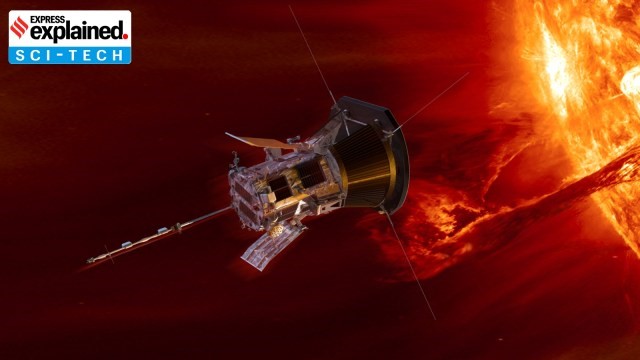
- 28 Dec 2024
In News:
NASA scientists announced that the Parker Solar Probe survived the closest-ever approach to the Sun. The craft was operating normally after it passed just 6.1 million km from the solar surface.
About the Parker Solar Probe:
- Launched: August 12, 2018, as part of NASA’s Living With a Star program.
- Named After: Eugene Newman Parker, a solar astrophysicist, marking the first NASA mission named after a living researcher.
- Mission Objectives:
- To study the Sun’s corona and the solar wind, investigating why the corona is hotter than the Sun’s surface.
- To explore the origins of solar winds and high-energy particles that impact space weather.
- To understand the structure and dynamics of plasma and magnetic fields around the Sun.
- To examine the mechanisms behind the acceleration and transportation of energetic particles.
Technological Feats:
- Heat Shield: Equipped with a 4.5-inch carbon-composite shield that withstands temperatures up to 1,377°C (2,500°F) while keeping the instruments cool at about 29.4°C (85°F).
- Speed: Travels at a speed of 692,000 km/h (430,000 mph), making it the fastest human-made object.
- Venus Flybys: Uses gravitational assists from Venus to gradually reduce its orbit and get closer to the Sun.
Historic Milestone:
- Closest Approach: On December 24, 2024, Parker Solar Probe reached a historic distance of 6.1 million km from the Sun's surface, the closest any human-made object has ever been.
- Comparison: If the Earth and Sun were 1 meter apart, Parker Solar Probe would be just 4 cm from the Sun.
- Temperature: At its closest, it endured temperatures up to 1,377°C.
Significance of the Mission:
- Scientific Contributions:
- Solar Wind: Helps scientists understand the origins of solar winds, which affect space weather and Earth’s technological systems.
- Corona Heating: Investigates why the Sun's corona is much hotter than its surface (a long-standing astrophysical mystery).
- Space Weather: Provides critical data for predicting space weather events that can impact satellites, communication systems, and power grids on Earth.
- Practical Implications:
- Improves understanding of space weather, potentially aiding in the protection of Earth’s infrastructure from solar storms.
- Technological and Engineering Marvel:
- Demonstrates advanced spacecraft technology that can withstand extreme conditions close to the Sun.
Recent Developments:
- Data Collection: As the probe passed through the Sun’s outer atmosphere (the corona), it collected valuable data expected to answer fundamental questions about solar behavior.
- Communication: Despite the extreme proximity to the Sun, the probe sent back a signal on December 26, confirming its status.
Key Dates:
- Launch: August 12, 2018.
- Closest Approach: December 24, 2024.
- Data Expected: Detailed telemetry data on January 1, 2025.
One Sun One World One Grid (OSOWOG) Initiative

- 10 Nov 2024
In News:
- India is in talks with Oman, UAE, Saudi Arabia, Maldives, and Singapore to establish cross-border electricity transmission lines.
- This is part of the ambitious OSOWOG initiative to create a global renewable energy grid.
Key Points:
- Proposed by the Prime Minister of India at the 2018 International Solar Alliance (ISA) Assembly.
- Aims to create a transnational electricity grid that delivers power worldwide.
- Led by India and the UK, in collaboration with ISA and the World Bank Group.
Vision of OSOWOG:
- Connect regional grids through a common infrastructure for the transfer of renewable energy, focusing on solar power.
- Harness solar and other renewable energy from regions where the sun is shining and efficiently transmit it to areas of need.
- Aim to provide power to 140 countries using clean and efficient solar energy.
Phases of OSOWOG:
- Phase 1:
- Connect the Indian grid with grids in the Middle East, South Asia, and South-East Asia.
- Share solar and other renewable energy resources.
- Phase 2:
- Expand the interconnected grid to include renewable resources from Africa.
- Phase 3:
- Achieve a global interconnection aiming for 2,600 GW by 2050.
- Integrate as many countries as possible into a single renewable energy grid.
Global Collaboration:
- Involves national governments, international organizations, legislators, power operators, and experts.
- Focus on accelerating infrastructure development for a clean energy-powered world.
INDIA DESERVES PERMANENT UNSC SEAT: BHUTAN
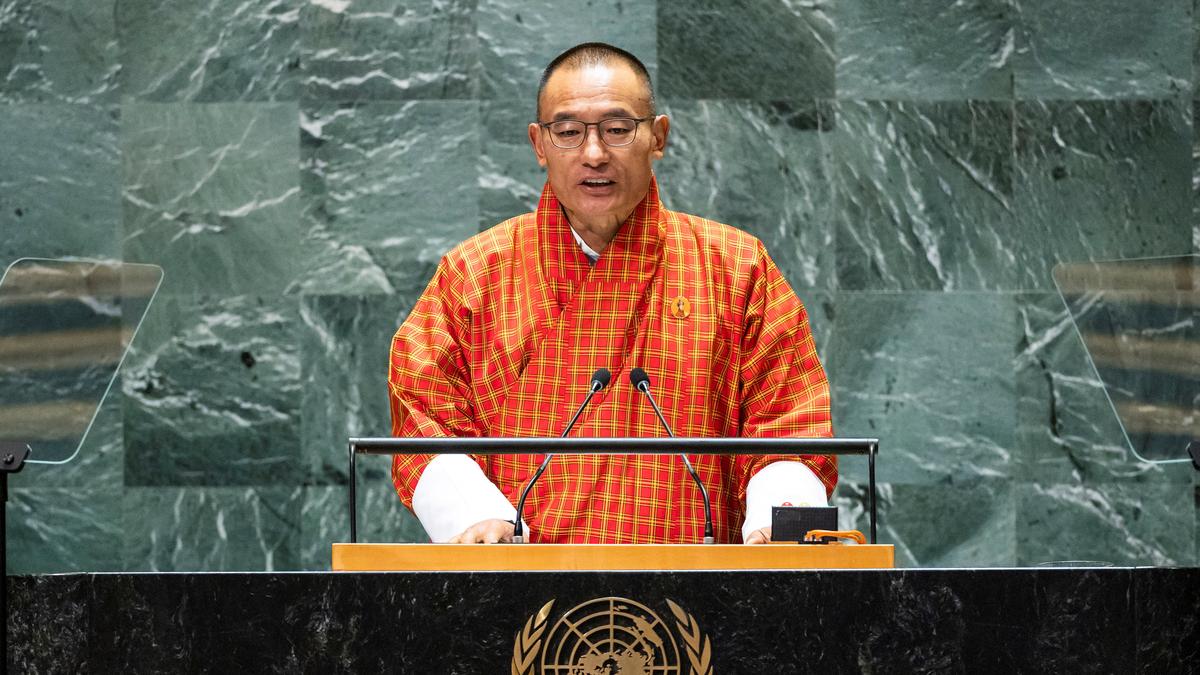
- 30 Sep 2024
In News:
With its significant economic growth and leadership of the Global South, India deserves a permanent seat at the UN Security Council, says Bhutan’s Prime Minister Tshering Tobgay.
Key Highlights:
- Economic Growth: Highlights India’s significant economic growth and its leadership in the Global South as justifications for this status.
- International Backing: India’s bid gains momentum with support from several UN Member States, including France, the UK, and the U.S.
- Need for Reform: Bhutan emphasized that the UNSC is outdated and must evolve to reflect contemporary geopolitical and economic realities.
- Advocacy for Representation: Bhutan has long called for a more representative and effective Security Council, backing India’s inclusion at the high table.
About UN Security Council (UNSC)
- Composition: Total of 15 member states.
- 5 permanent members (P5): China, France, Russia, the United Kingdom, and the United States (with veto rights).
- 10 non-permanent members elected for two-year terms.
- Election of Non-Permanent Members:
- Elected on a regional basis:
- 5 seats for African and Asian states.
- 2 seats for Latin American and Caribbean states.
- 1 seat for Eastern European states.
- 2 seats for Western European and other states.
- Elected on a regional basis:
- Presidency:
- Rotates monthly among members, following the English alphabetical order of country names.
- Primary Functions:
- Maintain international peace and security.
- Investigate and resolve disputes.
- Impose sanctions and authorize the use of force.
- Establish peacekeeping missions.
- Make recommendations to member states.
- Meeting Schedule:
- Regular meetings at UN headquarters in New York.
- Can convene at any time in response to emergencies.
- Decision-Making:
- Requires affirmative votes from at least 9 of the 15 members.
- Any of the P5 can veto resolutions, raising concerns about the Council's effectiveness.
- Subsidiary Bodies:
- Includes committees, working groups, and sanctions committees focused on specific issues like counter-terrorism, nuclear non-proliferation, and peacekeeping operations.
- Reforming the UN Security Council (UNSC)
- Charter Amendments:
- Reforming the UNSC requires amendments to the UN Charter.
- Voting Requirements:
- An amendment must be adopted by a two-thirds majority of the General Assembly.
- It must also be ratified by two-thirds of UN member states, including all permanent members of the UNSC.
- Charter Amendments:
POLITICAL DECLARATION ON ANTIMICROBIAL RESISTANCE (AMR)
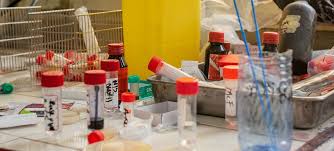
- 28 Sep 2024
In News:
World leaders have officially adopted the Political Declaration on Antimicrobial Resistance (AMR) at the UN High-Level Meeting, highlighting the urgent need for coordinated global action to combat AMR, which claims 1.27 million lives annually. This declaration recognizes drug-resistant tuberculosis (DR-TB) as a critical component of the global AMR response, marking a significant moment in the fight against antimicrobial resistance.
Key Highlights of the Declaration
- DR-TB Priority: The declaration emphasizes the severe burden that DR-TB imposes on health systems, especially in low- and middle-income countries (LMICs), and the potential reversal of progress made against tuberculosis and the Sustainable Development Goals.
- Global Death Reduction Target: A target to reduce global deaths associated with AMR by 10% by 2030 and a funding goal of USD 100 million to help at least 60% of countries establish funded AMR plans by 2025.
- Support for Vulnerable Groups: Recognition of the socioeconomic challenges faced by those affected by AMR, affirming the need for integrated, person-centered healthcare, including support to reduce stigma.
- Independent Panel for Action: Agreement to establish an independent panel to provide evidence for actions against AMR by 2025.
Commitment to Action
The Stop TB Partnership applauds this commitment and urges UN Member States to provide necessary funding for implementing the declaration's commitments. The partnership aims to work closely with governments and civil society to translate these commitments into concrete actions.
Challenges of Antimicrobial Resistance
AMR poses a significant threat, particularly in LMICs, where it exacerbates existing healthcare challenges:
- Increased Infections: Medical facilities often become hotspots for treatment-resistant infections, making routine procedures riskier. In LMICs, about 11% of surgical patients experience infections.
- Lack of Resources: Access to clean water, proper diagnostics, and antimicrobial medicines is often limited, increasing vulnerability to drug-resistant infections.
- Impact of Conflicts: AMR complicates treatment in conflict zones, where drug-resistant infections spread rapidly among displaced populations, further emphasizing the need for peaceful resolutions.
Economic Implications of AMR
The economic case for addressing AMR is compelling:
- Without a stronger response, AMR could lead to an additional $412 billion in healthcare expenditures annually over the next decade, along with $443 billion in losses due to workforce participation and productivity declines.
- Implementing critical AMR interventions is considered a “best buy,” with a potential return of $7 to $13 for every dollar invested.
ACHIEVING GLOBAL NUCLEAR DISARMAMENT
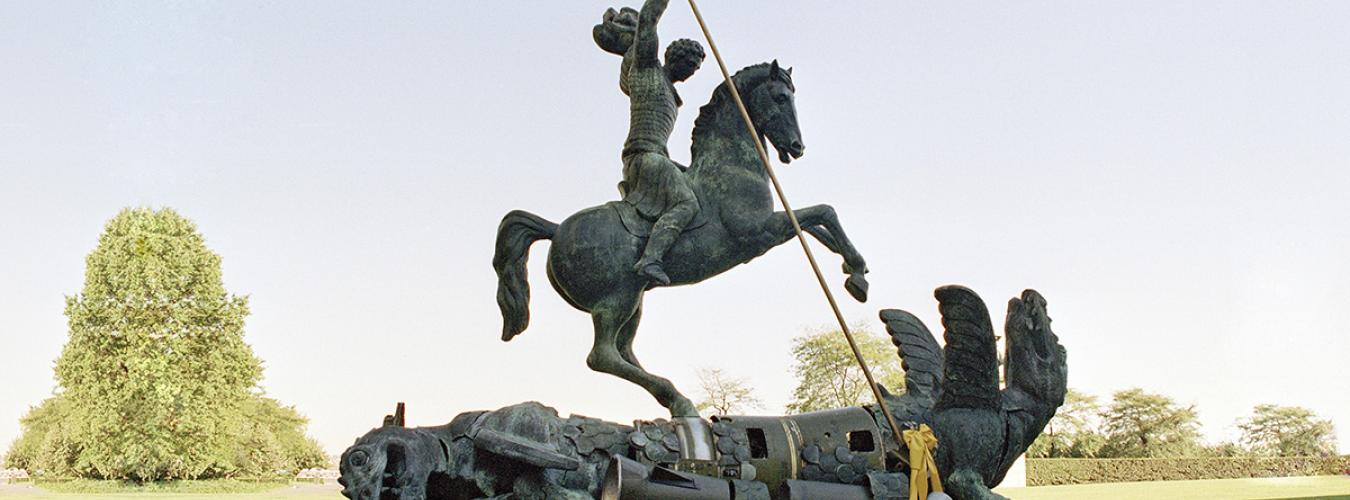
- 26 Sep 2024
Overview
Global nuclear disarmament remains a top priority for the United Nations, initially emphasized in the General Assembly’s first resolution in 1946. Despite historical efforts, approximately 12,100 nuclear weapons still exist today, with ongoing modernization plans in many countries.
Key Historical Milestones
- 1945: Atomic bombings of Hiroshima and Nagasaki, killing an estimated 213,000 people.
- 1946: First UN resolution identifies nuclear disarmament as a key goal.
- 1959: General Assembly endorses the goal of general and complete disarmament.
- 1963: Opening of the Partial Test Ban Treaty.
- 1978: First Special Session of the General Assembly dedicated to disarmament.
- 1996: Comprehensive Nuclear-Test-Ban Treaty opens for signature.
- 2017: Adoption of the Treaty on the Prohibition of Nuclear Weapons.
Recent Developments
- 2019: U.S. withdrawal from the Intermediate-Range Nuclear Forces Treaty.
- 2023: Russia suspends participation in the New START Treaty, raising concerns over arms control.
The International Day for the Total Elimination of Nuclear Weapons
- Established: December 2013, following a high-level meeting on nuclear disarmament.
- Observed: Annually on September 26.
- Purpose: Raise awareness about the dangers of nuclear weapons and promote their total elimination.
Goals of the International Day
- Enhance public education on the humanitarian risks associated with nuclear weapons.
- Mobilize international efforts towards a nuclear-weapon-free world.
Continuing Challenges
- The doctrine of nuclear deterrence remains central to the security policies of nuclear-armed states and their allies.
- No nuclear weapons have been destroyed under a treaty framework, and current disarmament negotiations are stagnant.
- Growing frustration among UN Member States over the slow progress in nuclear disarmament.
World Migration Report 2024
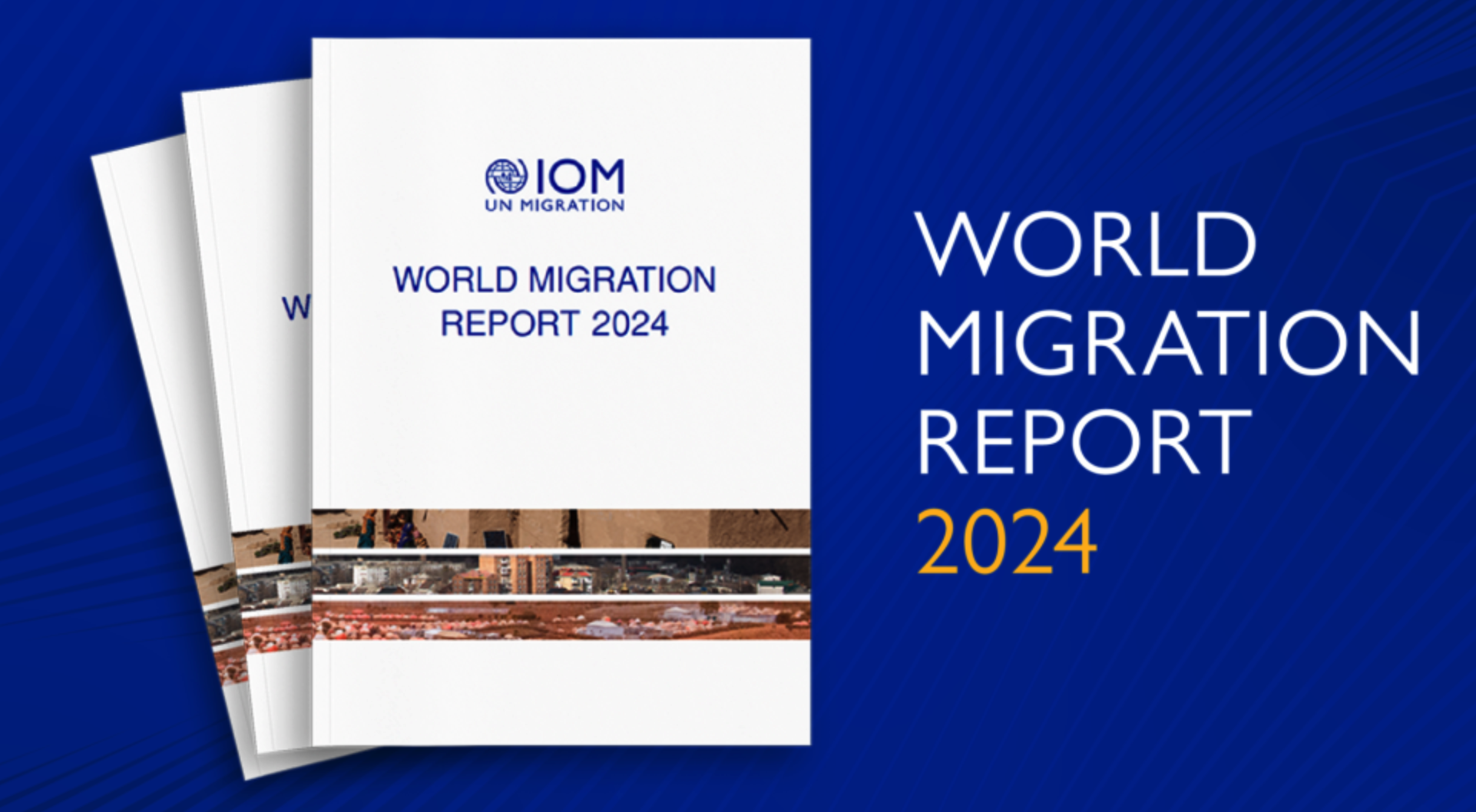
- 10 May 2024
Why is it in the News?
According to the recently released World Migration Report 2024, which is published by the International Organization for Migration (IOM), India has consistently been the top recipient of remittances globally.
Key Highlights of the World Migration Report 2024:
- Resilience Amidst COVID-19: Despite the challenges posed by the COVID-19 pandemic, international migration remains a vital driver of human development and economic progress.
- Notably, there has been a remarkable over 650 per cent surge in international remittances from 2000 to 2022, soaring from USD 128 billion to USD 831 billion.
- This growth defied predictions of a substantial decrease in remittances due to COVID-19.
- Remittances to Low and Middle-income Countries: Out of the total remittances, which amounted to USD 831 billion, a significant portion of USD 647 billion was sent by migrants to low and middle-income countries.
- These remittances play a crucial role in the GDPs of these nations, surpassing foreign direct investment globally.
- Persistent Challenges: While international migration continues to foster human development, the report underscores enduring challenges.
- The global population of international migrants has reached approximately 281 million, while the number of individuals displaced by conflict, violence, disasters, and other factors has surged to a record high of 117 million.
- Urgent action is imperative to address displacement crises effectively.
- Misinformation and Politicization: Despite the fact that most migration is regular, safe, and regionally focused, public discourse has been clouded by misinformation and politicization.
- It is essential to provide a clear and accurate depiction of migration dynamics to counteract this trend.
About the International Organization for Migration (IOM):
- Established in 1951, IOM, the UN Migration Agency, is the leading inter-governmental organization in the field of migration and works closely with governmental, intergovernmental and non-governmental partners.
- IOM works to help ensure the orderly and humane management of migration, promote international cooperation on migration issues, assist in the search for practical solutions to migration problems and provide humanitarian assistance to migrants in need, including refugees and internally displaced people.
- Membership: Currently, IOM counts 175 Member States and 8 states with Observer status.
- India joined as an IOM Member State on June 18, 2008.
- Headquarters: Situated in Geneva, Switzerland, IOM's headquarters serves as a hub for its global operations.
UN Counter-Terrorism Trust Fund
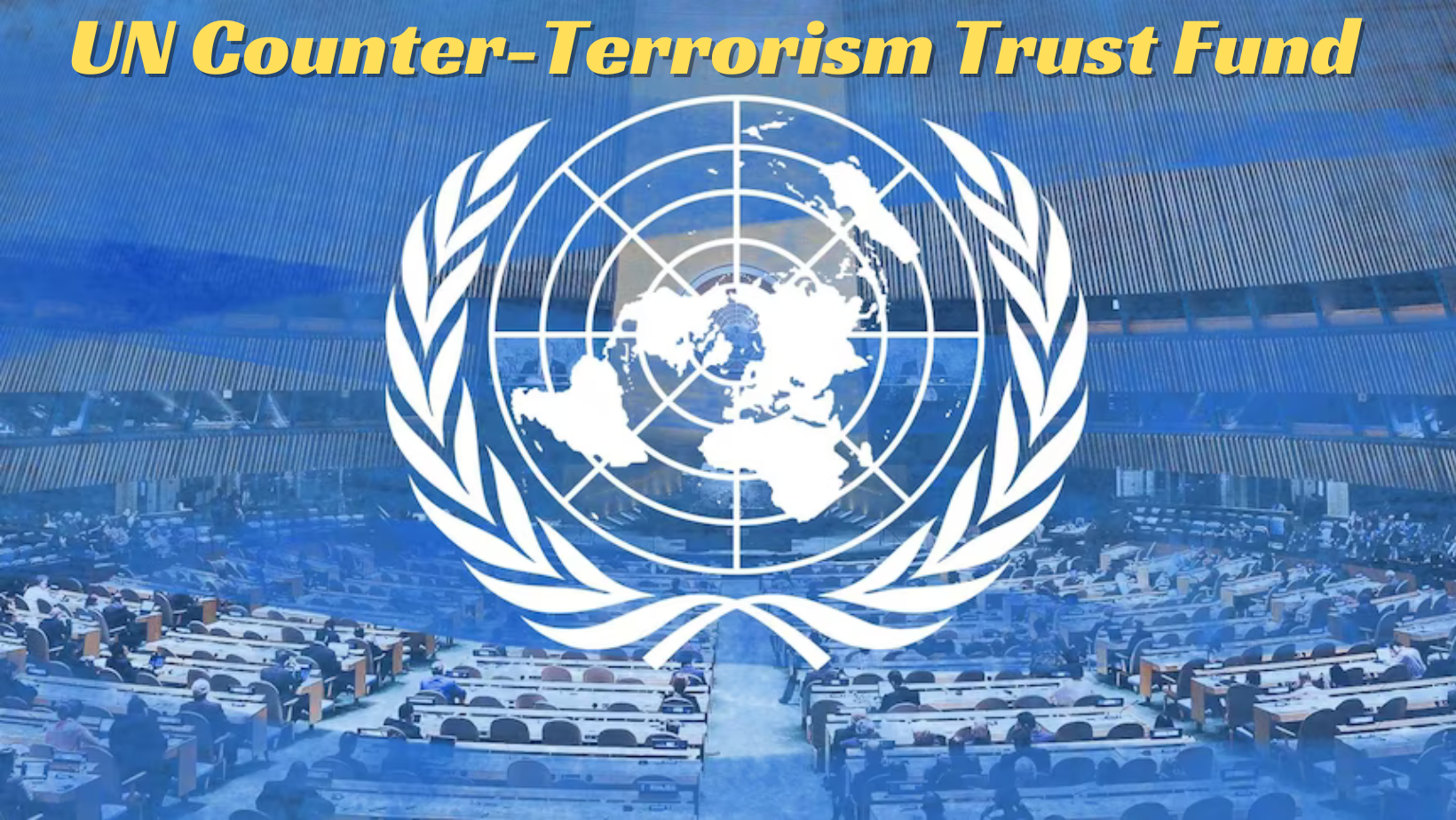
- 10 May 2024
Why is it in the News?
India recently contributed $5,00,000 to the UN Counter-Terrorism Trust Fund, reaffirming its unwavering commitment to the global fight against terrorism.
About the UN Counter-Terrorism Trust Fund:
- The United Nations Counter-Terrorism Trust Fund, founded in 2009 and transferred to the UN Office of Counter-Terrorism (UNOCT) in 2017, plays a crucial role in supporting global counter-terrorism initiatives.
- Contributions: Governments, inter-governmental and non-governmental organizations, private institutions, and individuals can all contribute to the fund.
- Contributions may be unearmarked or earmarked for specific global programmes or initiatives under UNOCT.
- India’s Contribution: India's contribution primarily supports UNOCT's global programmes, specifically focusing on Countering Financing of Terrorism (CFT) and the Countering Terrorist Travel Programme (CTTP).
- These initiatives aim to enhance the capacities of member states in eastern and southern Africa to combat terrorism financing and prevent the movement and travel of terrorists.
Key Facts about the UN Office of Counter-Terrorism (UNOCT):
- Established on June 15, 2017, through a UN General Assembly resolution, UNOCT is mandated to provide leadership and coordination on counter-terrorism efforts across the United Nations system.
- UNOCT's primary functions include enhancing collaboration among entities within the Global Counter-Terrorism Coordination Compact, ensuring a balanced implementation of the four pillars of the UN Global Counter-Terrorism Strategy, and strengthening capacity-building assistance for Member States.
- UNOCT also focuses on improving visibility, advocacy, and resource mobilization for UN counter-terrorism initiatives, while prioritizing the prevention of violent extremism within the broader counter-terrorism framework.
United Nations Entity for Gender Equality and the Empowerment of Women (UN Women)
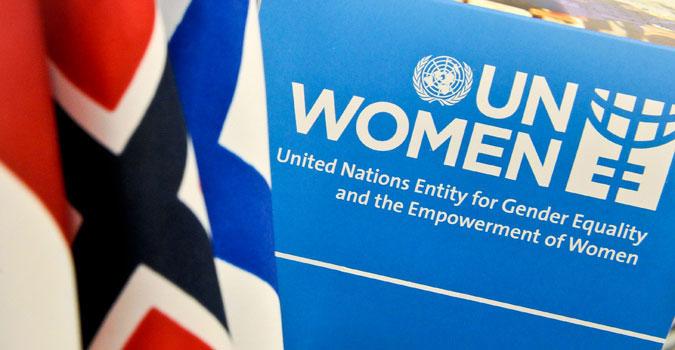
- 18 Apr 2024
Why is it in the News?
According to a recent report by UN Women, six months into the war, Gaza is facing a humanitarian crisis disproportionately impacting women and girls.
What is UN Women?
- Founded in 2010 by the United Nations General Assembly as part of the UN reform agenda.
- Merges resources and mandates to create a more significant impact on gender equality and women's empowerment.
- Serves as a global advocate for women and girls, addressing their needs and accelerating progress.
Key Roles:
- Supports intergovernmental bodies like the Commission on the Status of Women in developing policies, global standards, and norms for gender equality.
- Assists member states in implementing these standards and offers technical and financial support upon request.
- Builds effective partnerships with civil society organizations.
- Leads and coordinates the UN system's work on gender equality while promoting accountability through regular monitoring of progress.
Sustainable Development Goals (SDGs):
- Works globally to realize the SDGs for women and girls.
- Promotes women's equal participation in all aspects of life.
Country-level Support:
- Collaborates with government and non-governmental partners in countries that request assistance.
- Helps implement policies, laws, services, and resources to advance gender equality.
Grant-making Funds:
- Fund for Gender Equality: Provides grants to support innovative, high-impact programs by government agencies and civil society groups.
- UN Trust Fund to End Violence against Women: Finances initiatives that address violence against women and girls.
Commission on the Status of Women (CSW):
- A global policy-making body focused on gender equality and women's advancement.
- Operates as a functional commission of the United Nations Economic and Social Council (ECOSOC).
Information and Advocacy:
- Regularly provides information on women's rights issues to the General Assembly, ECOSOC, and the Security Council.
- Maintains the UN Secretary-General's database on violence against women, tracking measures taken by UN Member States and organizations.
- UN Women plays a vital role in advancing gender equality and women's empowerment worldwide by providing crucial support, resources, and advocacy through its various initiatives and collaborations.
UN Permanent Forum on Indigenous Issues
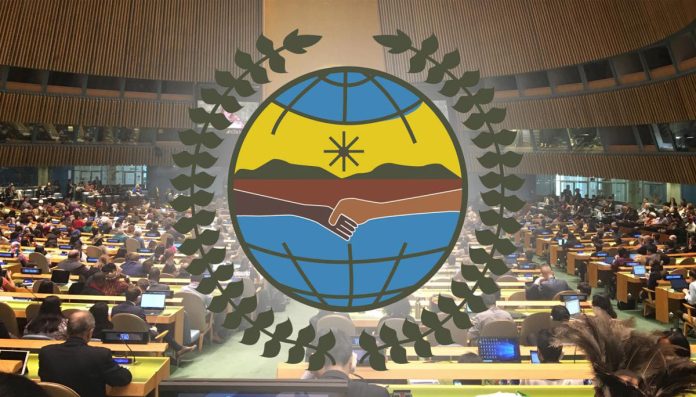
- 16 Apr 2024
Why is it in the News?
As the 23rd session of the UN Permanent Forum on Indigenous Issues begins in New York, United States on April 15, participants pointed out that though recognition of indigenous territories is increasing, it is not happening at the pace the planet needs.
About the UN Permanent Forum on Indigenous Issues:
- Established in 2000, the UNPFII serves as an advisory body to the United Nations Economic and Social Council (ECOSOC), focusing on indigenous issues related to economic and social development, culture, environment, education, health, and human rights.
- Alongside the Expert Mechanism on the Rights of Indigenous Peoples and the Special Rapporteur on the Rights of Indigenous Peoples, the UNPFII is one of three UN entities mandated to address Indigenous Peoples' issues.
The Permanent Forum's primary objectives include:
-
- Providing expert advice and recommendations to the Council, United Nations programs, funds, and agencies.
- Raising awareness and fostering integration and coordination of indigenous issues within the UN system.
- Preparing and disseminating information on indigenous issues.
Membership and Structure
- The UNPFII consists of sixteen independent experts who serve three-year terms and may be re-elected or re-appointed for one additional term.
- Eight members are nominated by governments, while the remaining eight are nominated directly by indigenous organizations from their respective regions.
- Following each session, the UNPFII submits a report containing recommendations and draft decisions to the ECOSOC, contributing to global efforts to address and improve the well-being of Indigenous Peoples worldwide.
India-led ‘Group of Friends’
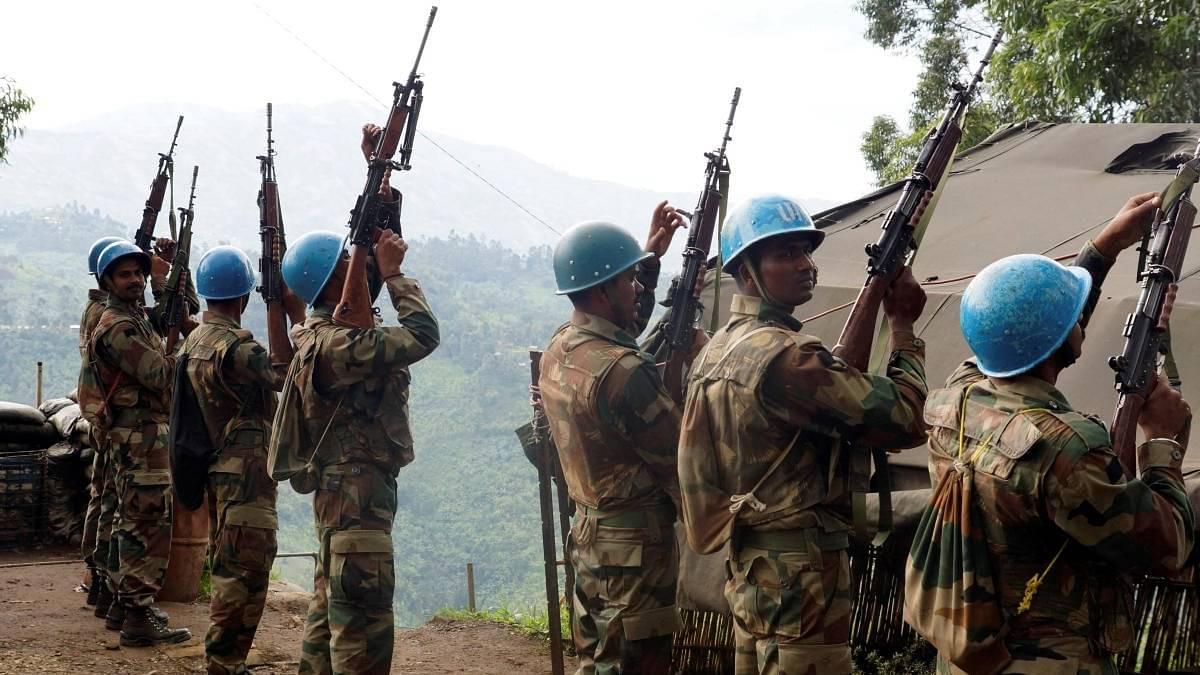
- 30 Mar 2024
Why is it in the News?
At a high-level meeting of the India-led 'Group of Friends (GOF), India launched a new database designed to record crimes against UN peacekeepers and monitor progress in holding perpetrators accountable.
About the 'Group of Friends':
- The Group of Friends (GOF) was launched by India in 2022 to promote accountability for crimes against the Blue Helmets during its presidency of the UN Security Council.
- India, Bangladesh, Egypt, France, Morocco, and Nepal are co-chairs of the GOF, which comprises 40 member states.
Key objectives of the group include:
- Engaging and sharing information with the UN Secretary-General to assist member states hosting or having hosted peacekeeping operations in bringing perpetrators of crimes against peacekeepers to justice.
- Serving as an informal platform at the UN to exchange information, share best practices, and mobilize resources to facilitate accountability for crimes against peacekeepers.
- Monitoring progress on bringing accountability for crimes against peacekeepers.
- The 'Group of Friends' will convene two meetings of its members per year and organize one event annually involving Permanent Missions and other stakeholders, ensuring greater safety and security for peacekeepers.
- This initiative represents the political will of member states, particularly troop and police contributing countries, to champion the implementation of UN Security Council resolution 2589, adopted in August 2021 under India's Presidency of the Council.
- Resolution 2589 called upon member states hosting or having hosted UN peacekeeping operations to take all appropriate measures to bring to justice perpetrators of violence against UN personnel, including their detention and abduction.
- The 'Group of Friends serves as a crucial platform for advancing this resolution, promoting accountability, and enhancing the protection of peacekeepers worldwide.
India's Significant Role in UN Peacekeeping:
- As a longstanding advocate for global peace and stability, India has demonstrated its commitment to United Nations (UN) peacekeeping operations.
- Over the past seven decades, India has contributed more than 260,000 peacekeepers, making it the largest cumulative contributor to UN peacekeeping missions.
- Despite the risks associated with such endeavors, India has remained steadfast in its support of peacekeeping efforts.
- Tragically, 177 Indian peacekeepers have made the ultimate sacrifice in the line of duty, reflecting India's dedication to fostering stability worldwide.
- Presently, India has more than 6,000 peacekeepers deployed in nine out of the twelve UN peacekeeping missions.
- As a strong proponent of accountability for crimes against peacekeepers, India plays a crucial role in advocating for the safety and security of these dedicated personnel.
Protesting new hit-and-run law, truckers dial down after talks with Home Secretary (Indian Express)
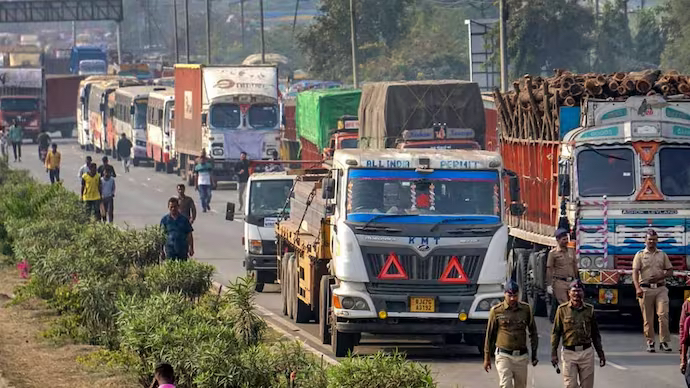
- 03 Jan 2024
Why is it in the News?
The All India Motor Transport Association (AIMTC) decided to end the nationwide truck drivers protests against the new hit-and-run law, after a meeting with Union Home Secretary Ajay Bhalla.
What is the New Hit-and-run Law?
The recently enacted Bharatiya Nyay Sanhita introduces stringent penalties for hit-and-run incidents in India.
- The law specifies that an accused individual causing a fatal crash and fleeing the scene without reporting to authorities could face imprisonment for up to 10 years along with a fine of Rs 7 lakh.
- Bharatiya Nyay Sanhita has established two distinct categories under the umbrella of "causing death by negligence."
- The first category addresses causing death through any rash or negligent act that does not amount to culpable homicide.
- Offenders in this category may face imprisonment for up to five years and a fine.
- The second category deals with causing death through rash and negligent driving, not amounting to culpable homicide.
- If the individual escapes without promptly reporting the incident to a police officer or magistrate, they could be subjected to up to 10 years of imprisonment and a fine.
What was the Hit-and-run Law Before?
- The old, British-era Indian Penal Code (IPC) did not have a specific provision for hit-and-run cases.
- Actions in such cases were taken under Section 304 A of the IPC.
- According to that section, a person causing the death of another due to a rash or negligent act could invite a jail term of a maximum of 2 years or be fined.
- "Whoever causes the death of any person by doing any rash or negligent act not amounting to culpable homicide, shall be punished with imprisonment of either description for a term which may extend to 2 years, or with fine, or with both," the section stated.
- All cases of hit-and-run along with other forms of activities that came under the ambit of causing death by a "rash and negligent act" were lodged under Section 304 A of the IPC.
Sports Ministry requests IOA to constitute an ad-hoc committee to manage WFI affairs (Indian Express)
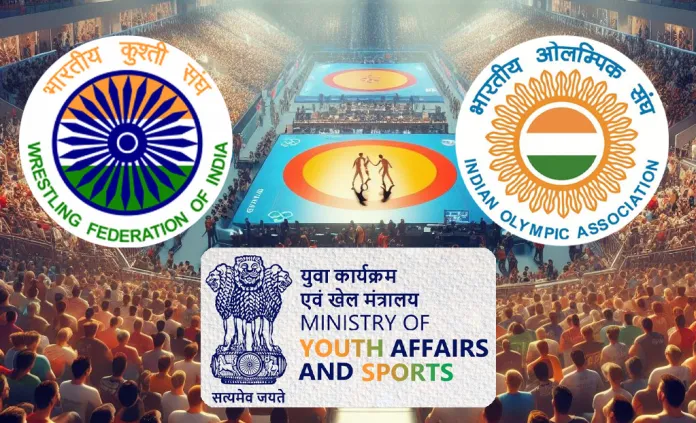
- 25 Dec 2023
Why is it in the News?
After suspending the newly elected Wrestling Federation of India (WFI) body on Sunday, the Sports Ministry have requested the Indian Olympic Association to constitute an ad-hoc committee to manage and control the affairs of the federation.
News Summary:
- Three days after the Wrestling Federation of India (WFI) elected a new governing council to run the sport in India, the Union Ministry of Youth Affairs and Sports directed the body to suspend all activities.
- It issued a letter to the Indian Olympic Association (IOA) to create an ad-hoc committee to manage and control the affairs of the WFI.
About the Wrestling Federation of India (WFI):
- Established in 1958 and headquartered in New Delhi, the Wrestling Federation of India (WFI) serves as the governing body for wrestling.
- Mission: WFI plays a pivotal role in nurturing and promoting wrestling talent for prestigious events such as the Olympics, Asian Games, National Wrestling Championships, and World Wrestling Championships.
- Affiliation: As an integral part of the Indian Olympic Association (IOA), WFI operates in accordance with the rules and regulations set forth by both the International Olympic Committee (IOC) and United World Wrestling (UWW).
- The UWW, recognized as the international governing body for wrestling, holds responsibilities ranging from overseeing wrestling competitions at the World Championships to ensuring adherence to standards at the Olympic level.
- WFI's Contract System for Wrestlers: In a groundbreaking move in 2018, WFI introduced an innovative contract system designed to support wrestlers.
- This system categorizes wrestlers into four grades:
- Grade A, providing financial assistance of 30 lakh rupees.
- Grade B offers a financial support package of 20 lakh rupees.
- Grade C, extending support amounting to 10 lakh rupees.
- Grade D provides a support package of 5 lakh rupees.
- To ensure relevance and fairness, the contracts undergo a thorough review on an annual basis, reflecting WFI's commitment to the ongoing development and support of wrestling talent.
About Indian Olympic Association (IOA):
- The Indian Olympic Association acts as the governing body overseeing the Olympic Movement and the Commonwealth Games within India.
- It holds affiliation with prominent international bodies, including the International Olympic Committee (IOC), Commonwealth Games Federation (CGF), Olympic Council of Asia (OCA), and Association of National Olympic Committees (ANOC).
- In fulfilling its role, the IOA manages key aspects of sports governance and prioritizes the welfare of athletes across the nation.
- Responsibilities: As a recognized entity by the Ministry of Youth Affairs and Sports, the IOA undertakes the crucial responsibility of coordinating the representation of athletes and teams in major international multi-sport events such as the Olympic Games, Commonwealth Games, Asian Games, and others sanctioned by the IOC, CGF, OCA, and ANOC.
- Historical Perspective: Established in 1927 with Sir Dorabji Tata serving as the Founding President and Dr. A.G. Noehren as the Secretary-General, the IOA operates as a Non-Profit Organization under the Societies Registration Act of 1860.
- This history underscores its enduring commitment to the promotion of sports.
- Governance Structure: Currently governed by a 32-member Executive Council, the IOA is led by a President.
- Elections for the Executive Council occur once every four years, emphasizing democratic and periodic leadership changes within the organization.
High-energy Particle "Amaterasu" (Indian Express)
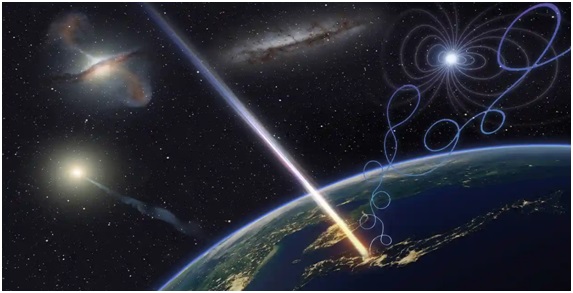
- 27 Nov 2023
Why is it in the News?
Scientists have detected one of the most powerful cosmic rays ever slamming into Earth but they have no idea what caused it or where it came from.
What is Amaterasu?
- The particle, named Amaterasu after the sun goddess in Japanese mythology, is one of the highest-energy cosmic rays ever detected.
- The Amaterasu particle has an energy exceeding 240 exa-electron volts (EeV).
- It is millions of times more than particles produced in the Large Hadron Collider, the most powerful accelerator ever built, and equivalent to the energy of a golf ball traveling at 95mph.
- It comes only second to the Oh-My-God particle, another ultra-high-energy cosmic ray that came in at 320 EeV, detected in 1991.
- Amaterasu appears to have emerged from the Local Void, an empty area of space bordering the Milky Way galaxy.
What are Cosmic Rays?
- Cosmic rays are high-energy particles, primarily protons and atomic nuclei, that originate from outer space and bombard Earth from all directions.
- They possess extraordinary energies, often exceeding those achievable in human-made accelerators.
- Created through various astrophysical processes, such as supernova explosions and the remnants of massive stars, cosmic rays travel through the vast expanse of space.
- Upon entering Earth's atmosphere, they collide with air molecules, initiating cascades of secondary particles.
- These rays play a crucial role in astrophysics, providing insights into the universe's most energetic phenomena.
- They contribute to our understanding of cosmic structures, magnetic fields, and the dynamics of celestial bodies.
- Despite their significance, the origins of certain ultra-high-energy cosmic rays remain mysterious, prompting ongoing research to unveil the secrets of these enigmatic particles.
UN Office for the Coordination of Humanitarian Affairs (OCHA) (TOI)
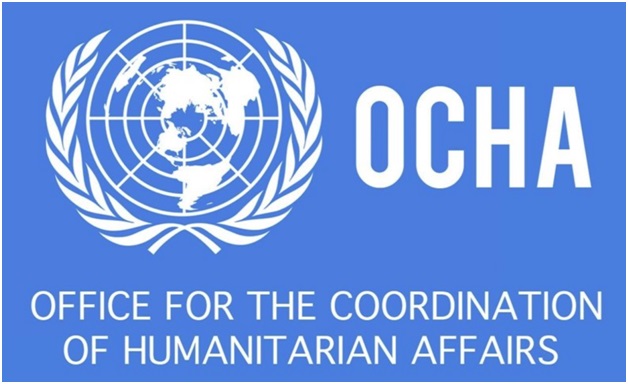
- 03 Nov 2023
Why in the News?
??The UN Office for the Coordination of Humanitarian Affairs (OHCA), on Friday, launched an emergency aid appeal seeking $1.2 billion to help some 2.7 million people in Gaza and the West Bank.
About the UN Office for the Coordination of Humanitarian Affairs (OCHA):
- OCHA is part of the United Nations (UN) and focuses on humanitarian issues.
- It coordinates and leads UN responses to humanitarian crises worldwide.
- It was established by the General Assembly of the United Nations in 1991.
- OCHA's goal is to save lives, protect people, and help those affected by disasters and conflicts.
- It works with governments, non-governmental organizations (NGOs), and other partners to respond to emergencies.
- It provides funding to support relief efforts in crisis-affected regions.
- There are two types of pooled funds:
- The Central Emergency Response Fund (CERF) can provide financial support for emergencies anywhere on the globe.
- Country-Based Pooled Funds (CBPFs) are specific to individual countries.
- These funds operate from two central hubs located in Geneva and New York, serving as global operational centres.
- The office works to ensure that humanitarian aid reaches those in need.
- It has two headquarters locations, Geneva and New York, which act as centres of global operations.
- It helps plan and manage humanitarian responses, ensuring efficiency and effectiveness.
- OCHA promotes coordination among humanitarian organizations to avoid duplication and ensure better outcomes.
India-UN Capacity Building Initiative (News On Air)
- 25 Sep 2023
What is the News ?
India and the United Nations have introduced a collaborative capacity-building effort known as the 'India-UN Capacity Building Initiative.' Its goal is to promote progress and prosperity in the Global South.
Facts About:
What is the Global South?
- The Global South encompasses countries in regions such as Africa, Latin America and the Caribbean, Asia (excluding Israel, Japan, and South Korea), and Oceania (excluding Australia and New Zealand).
- These regions are generally characterized by lower levels of economic and industrial development.
About the India-UN Capacity Building Initiative:
- This initiative aims to enhance the capabilities of countries in the Global South.
- Its objective is to facilitate the sharing of India's development experiences, best practices, and expertise through capacity-building programs and training.
- The initiative extends the achievements of India's G20 Presidency, which emphasized the inclusion of perspectives from the Global South in the G20 agenda.
- It builds upon India's existing bilateral cooperation in development and capacity-building with partner countries.
- As part of this endeavor, the UN India team will collaborate with the Bill & Melinda Gates Foundation to leverage India's Technical and Economic Cooperation platform. This partnership will enable the dissemination of India's development experiences and best practices worldwide.
- Furthermore, it will translate the development objectives outlined during India's G20 Presidency into action.
- This includes the implementation of the G20 Action Plan for advancing the Sustainable Development Goals (SDGs) and enhancing technology and digital infrastructure.
